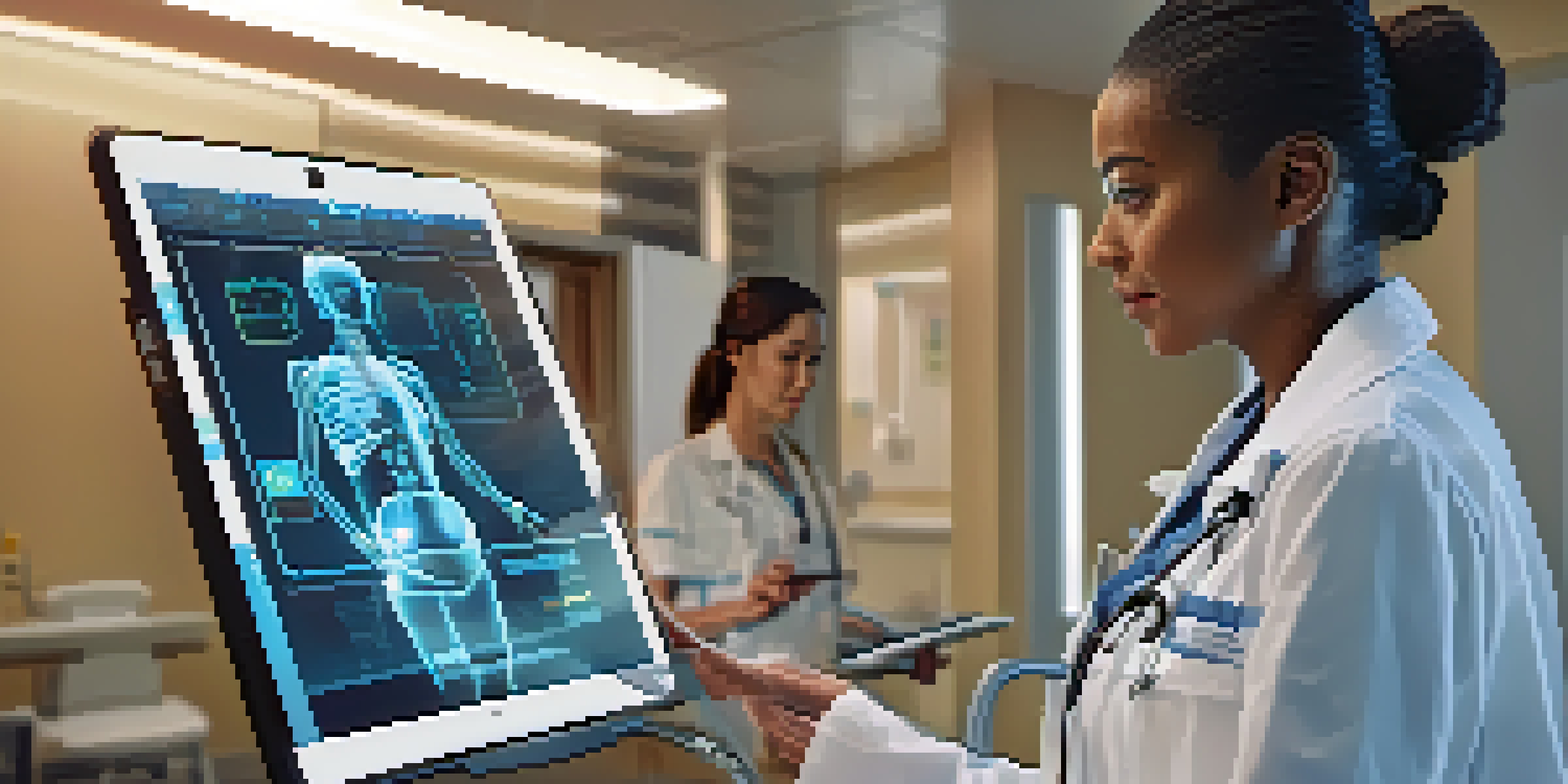AI in Healthcare: Transforming Jobs and Career Opportunities

Introduction: The Rise of AI in Healthcare
Artificial Intelligence (AI) is revolutionizing the healthcare sector, making it more efficient and effective. From predictive analytics to robotic surgery, AI is enhancing the way care is delivered. As these technologies evolve, they not only improve patient outcomes but also transform the job landscape within the industry.
Artificial Intelligence will not replace doctors, but doctors who use Artificial Intelligence will replace those who don't.
Healthcare professionals are increasingly required to adapt to new tools and systems powered by AI. This shift means that traditional roles are evolving, and new positions are emerging that focus on technology integration. Understanding these changes is crucial for anyone looking to build a career in this dynamic field.
In this article, we will delve into how AI is changing healthcare jobs and what this means for future career opportunities. Whether you're a seasoned professional or just starting, the impact of AI is significant and deserves our attention.
AI's Impact on Traditional Healthcare Roles
One of the most profound effects of AI is its influence on traditional healthcare roles like doctors and nurses. These professionals are now using AI tools to assist in diagnosis, treatment plans, and monitoring patient progress. This integration not only improves efficiency but also allows healthcare workers to focus more on patient care.

For example, AI algorithms can analyze medical images faster than human eyes, helping radiologists detect anomalies more accurately. With this support, healthcare workers can make quicker decisions, ultimately enhancing the patient experience. As a result, roles are shifting from purely clinical tasks to more analytical and strategic responsibilities.
AI Transforms Healthcare Careers
The integration of AI in healthcare is reshaping traditional roles and creating new job opportunities.
This transition is not about replacing human workers but rather augmenting their capabilities. Professionals who embrace AI tools will likely find their roles enriched and their skills in higher demand, making adaptability a key asset in the evolving job market.
Emerging Job Opportunities in AI-Driven Healthcare
As AI continues to infiltrate healthcare, new job opportunities are emerging. Positions such as AI data analysts, health informatics specialists, and telehealth coordinators are gaining traction. These roles focus on leveraging AI technologies to analyze health data and improve patient engagement.
The greatest danger in times of turbulence is not the turbulence; it is to act with yesterday's logic.
For instance, AI data analysts are crucial in interpreting vast amounts of health information to derive actionable insights. Their work helps healthcare organizations streamline operations and enhance patient outcomes. As the demand for such expertise grows, professionals in the field must prepare to fill these gaps.
Moreover, the rise of telehealth has created roles specifically designed to improve virtual patient care. These opportunities not only reflect the technological advancements in healthcare but also highlight the need for professionals who can manage and implement these new systems.
Skill Sets Required for AI in Healthcare Careers
With the integration of AI in healthcare, professionals need to develop a unique set of skills. Understanding data analytics, machine learning principles, and health informatics are essential for those looking to thrive in this environment. These skills will be crucial for interpreting AI-generated data and making informed decisions.
Additionally, soft skills such as communication and collaboration are equally important. As healthcare teams become more interdisciplinary, the ability to work alongside tech specialists and other healthcare professionals is vital. Cultivating these skills will enhance career prospects in an AI-driven landscape.
Essential Skills for Success
Professionals in healthcare must develop skills in data analytics and communication to thrive in an AI-driven environment.
Continuing education and professional development can help bridge the gap for many in the industry. Many institutions now offer courses and certifications focusing on AI applications in healthcare, empowering professionals to stay relevant and competitive.
Challenges of AI Integration in Healthcare Jobs
While AI presents numerous opportunities, it also poses challenges for healthcare professionals. Resistance to change is a common hurdle, as many workers may feel overwhelmed by the rapid pace of technological advancements. Addressing these concerns is essential to foster a culture that embraces innovation.
Moreover, ethical considerations surrounding AI use in healthcare must be taken into account. Issues such as data privacy, bias in algorithms, and transparency can impact trust in AI systems. Educating professionals about these ethical dilemmas will be crucial in ensuring responsible AI adoption.
Therefore, creating a supportive environment where workers can voice their concerns and receive proper training is vital. By addressing these challenges head-on, the transition to an AI-enhanced workforce can be smoother and more effective.
The Future of AI in Healthcare Careers
Looking ahead, the future of AI in healthcare careers is promising and full of potential. As technology continues to advance, we can expect to see even more innovative applications that will further transform the industry. This evolution will create a wealth of opportunities for those prepared to adapt.
Emerging fields such as personalized medicine and genomic data analysis will expand the job market even further. Professionals with expertise in these areas will be in high demand, underscoring the importance of staying informed about industry trends.
Embracing Innovation is Key
To succeed in the evolving landscape, healthcare workers need to adapt to technological changes and embrace continuous learning.
Ultimately, the key to thriving in an AI-driven healthcare landscape is flexibility. Those who are open to learning new skills and adapting to changes will find themselves well-positioned for success in this exciting new era.
Conclusion: Embracing Change in Healthcare Careers
In conclusion, AI is set to revolutionize healthcare jobs and career opportunities in unprecedented ways. While the integration of technology presents challenges, it also opens doors to innovative roles that were once unimaginable. Embracing this change will not only enhance patient care but also empower healthcare professionals.
As AI continues to develop, those in the healthcare field must be proactive in acquiring new skills and embracing technology. This adaptability will ensure that they remain relevant and competitive in this rapidly evolving landscape. The future is bright for those willing to take the plunge into the world of AI-driven healthcare.

By understanding and embracing these changes, healthcare professionals can not only enhance their careers but also play a pivotal role in shaping the future of healthcare itself.